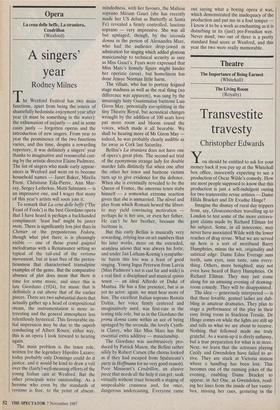Theatre
The Importance of Being Earnest (Whitehall) The Living Room (Royalty)
Transvestite travesty
Christopher Edwards
You should be entitled to ask for your money back if you pay up at the Whitehall box office, innocently expecting to see a production of Oscar Wilde's comedy. How are most people supposed to know that this production is just a self-indulgent outing for two transvestite revue artistes — Dame Hilda Bracket and Dr Evadne Hinge?
Imagine the dismay of rural day trippers from, say, Gloucestershire travelling up to London to test some of the more extrava- gant claims made by Richard Ellman for his subject. Some, in all innocence, may never have associated Wilde with the lower reaches of drag revue. What we are served up here is a sort of moribund Barry Humphries, minus the wit, originality and satirical edge: Dame Edna Everage sans teeth, sans eyes, sans taste, sans every- thing. Others, more benighted, may not even have heard of Barry Humphries. Or Richard Ellman. They may just come along for an amusing evening of drawing- room comedy. They will be disappointed.
The idea — generously interpreted — is that these lovable, genteel ladies are dab- bling in amateur dramatics. They plan to stage a performance of the play in their cosy living room in Stackton Tressle. Dr Hinge comes on while the lights are still up and tells us what we are about to receive. Nothing that followed made me truly grateful. As a warm-up it is direly unfunny, but a true preparation for what is in store. Next, we learn that the actresses playing Cecily and Gwendolen have failed to ar- rive. They are stuck at Victoria station where a handbag has been lost. This becomes one of the running jokes of the evening, enabling Dame Bracket to appear, in Act One, as Gwendolen, read- ing her lines from the inside of her vanity- box, missing her cues, gesturing in the wrong direction, etc. It is unremittingly awful and flat.
And then to the high point of the evening, to what must be the raison d'etre of the whole exercise, the appearance of Dr Hinge as Lady Bracknell. Or rather, as Edith Evans. Every line is delivered in the voice of a camp gorgon — disdainful, gutteral whoops and soarings. Virtually every line tries to rival, in tenor, Edith Evans's famous handbag utterance, but instead of grand dame comic monster we get over-inflated archness, complete with the actor's full portfolio of three mincing, pouting mannerisms.
It goes without saying that the social milieu of the play, Oscar Wilde's wit, the performarices of the actors playing Algy, Worthing and Lane the manservant — all are left hanging in tatters. I left in the inter- val, but I don't believe the second half was any better. There cannot be a worse con- ceived production anywhere in London.
The revival of Graham Greene's first play, The Living Room (1953), at the Royalty is a real curiosity. Certainly the author himself was curious enough to come over to London to see it, even if he may have wondered why the company chose to produce this one rather than, say, The Potting Shed. For those with long memor- ies, this was the play in which the young Dorothy Tutin made her debut — amazing everyone with her completely natural tech- nique. Some may also remember that this was a play censored by the Lord Chamber- lain — the reference to goo' was cut, as was the sound of the offending loo flushing, off stage. Despite these swingeing cuts, however, it still managed to shock people by references to an adulterous couple spending afternoons together in a hotel, and by its more or less direct discussion of a young virgin's sexual ex- periences. Tynan, writing retrospectively about the decade, noted that this piece, along with Rattigan's Separate Tables, showed that audiences were ready for plays about the facts of contemporary life.
But the appeal of the play lies far more in its highly intelligent, unfashionable moral debate. As a study of the moral dilemmas of adultery — the candidates are a middle-aged husband (played by Peter Blythe) and Rose (Katharine Schlesinger) as his very young lover — it is far more subtle, humane, funny and convincingly painful than any number of the repartee- toting pieces on the subject that you find on television and in the West End.
In this, his first play, the author shows little flair for the essentials of theatre, and, inevitably, some aspects of the piece have dated -- Rose's discussion on the liberating effects of sex, for instance. What endures, however, and indeed what prevails over the author's clusiness as a craftsman, is the dignified and touching pessimism of his moral vision. It is a collector's piece of theatre and is excellently acted by a first- rate cast.



































































 Previous page
Previous page